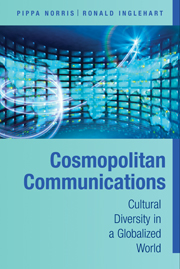Book contents
- Frontmatter
- Contents
- Tables and Figures
- Acknowledgments
- INTRODUCTION
- 1 Is Cultural Diversity Under Threat?
- 2 Theoretical Framework
- PART I FIREWALLS
- PART II CONSEQUENCES
- CONCLUSIONS
- Technical Appendix A: Concepts and Measures
- Technical Appendix B: List of Countries
- Technical Appendix C: Methods and Multilevel Regression Models
- Notes
- Select Bibliography
- Index
- Titles in the Series
2 - Theoretical Framework
Published online by Cambridge University Press: 05 June 2012
- Frontmatter
- Contents
- Tables and Figures
- Acknowledgments
- INTRODUCTION
- 1 Is Cultural Diversity Under Threat?
- 2 Theoretical Framework
- PART I FIREWALLS
- PART II CONSEQUENCES
- CONCLUSIONS
- Technical Appendix A: Concepts and Measures
- Technical Appendix B: List of Countries
- Technical Appendix C: Methods and Multilevel Regression Models
- Notes
- Select Bibliography
- Index
- Titles in the Series
Summary
Many voices can be heard in the dispute over the consequences of cosmopolitan communications. The empirical evidence on this issue remains mixed; the results are inconclusive, and there are plausible counterclaims to each argument. The popular debate is based largely on theoretical speculation about the possible consequences of the widely observed structural and economic changes in the production and distribution of mass communications, rather than on a careful empirical examination of how public opinion is actually changing in the light of survey evidence. As in Bhutan, the people in developing societies exposed to imported American or Western television, movies, and news often encounter values, practices, and ways of life that conflict with those traditionally found at home. But it remains unclear from the existing research whether, and under what conditions, this process erodes traditional aspects of distinctive national cultures. Do cosmopolitan communications accelerate the assimilation of modern values in traditional societies, as argued by the convergence thesis? Or do they trigger a backlash among those who feel most threatened by this process, as the polarization thesis proposes? Do they produce a fusion culture, with strands borrowed from different places and societies? Or as the firewall model suggests, are deeply rooted attitudes and values relatively robust in the face of mass communication flows? At this point, the answers to these questions are not clear. The evidence thus deserves rigorous scrutiny.
Information
- Type
- Chapter
- Information
- Cosmopolitan CommunicationsCultural Diversity in a Globalized World, pp. 28 - 72Publisher: Cambridge University PressPrint publication year: 2009
